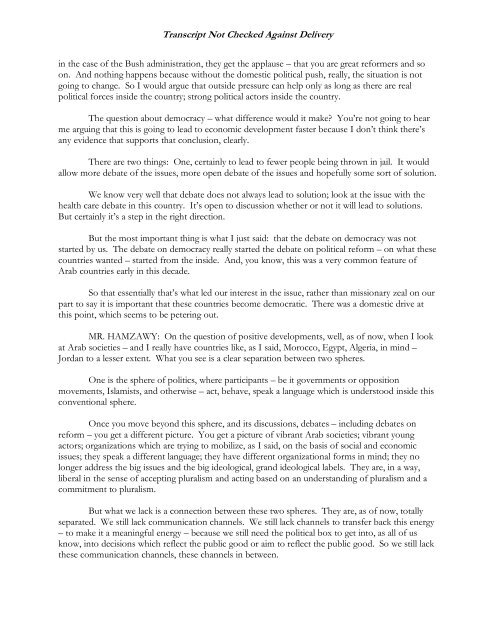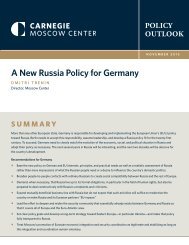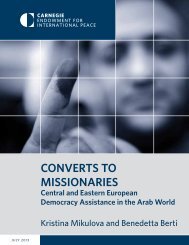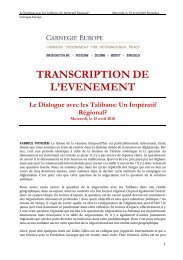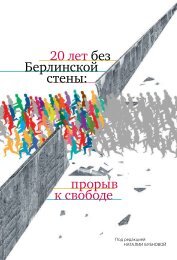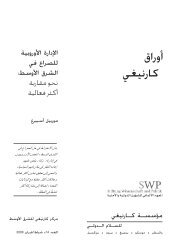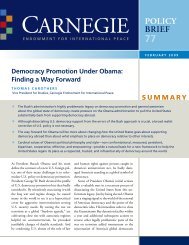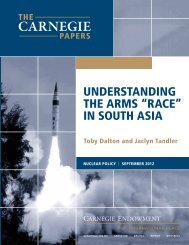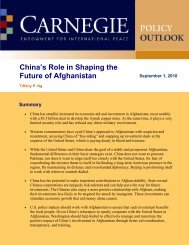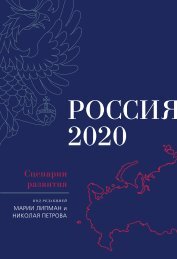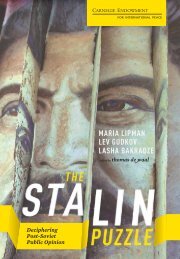getting to pluralism: political actors in the arab world - Carnegie ...
getting to pluralism: political actors in the arab world - Carnegie ...
getting to pluralism: political actors in the arab world - Carnegie ...
Create successful ePaper yourself
Turn your PDF publications into a flip-book with our unique Google optimized e-Paper software.
Transcript Not Checked Aga<strong>in</strong>st Delivery<br />
<strong>in</strong> <strong>the</strong> case of <strong>the</strong> Bush adm<strong>in</strong>istration, <strong>the</strong>y get <strong>the</strong> applause – that you are great reformers and so<br />
on. And noth<strong>in</strong>g happens because without <strong>the</strong> domestic <strong>political</strong> push, really, <strong>the</strong> situation is not<br />
go<strong>in</strong>g <strong>to</strong> change. So I would argue that outside pressure can help only as long as <strong>the</strong>re are real<br />
<strong>political</strong> forces <strong>in</strong>side <strong>the</strong> country; strong <strong>political</strong> ac<strong>to</strong>rs <strong>in</strong>side <strong>the</strong> country.<br />
The question about democracy – what difference would it make? You’re not go<strong>in</strong>g <strong>to</strong> hear<br />
me argu<strong>in</strong>g that this is go<strong>in</strong>g <strong>to</strong> lead <strong>to</strong> economic development faster because I don’t th<strong>in</strong>k <strong>the</strong>re’s<br />
any evidence that supports that conclusion, clearly.<br />
There are two th<strong>in</strong>gs: One, certa<strong>in</strong>ly <strong>to</strong> lead <strong>to</strong> fewer people be<strong>in</strong>g thrown <strong>in</strong> jail. It would<br />
allow more debate of <strong>the</strong> issues, more open debate of <strong>the</strong> issues and hopefully some sort of solution.<br />
We know very well that debate does not always lead <strong>to</strong> solution; look at <strong>the</strong> issue with <strong>the</strong><br />
health care debate <strong>in</strong> this country. It’s open <strong>to</strong> discussion whe<strong>the</strong>r or not it will lead <strong>to</strong> solutions.<br />
But certa<strong>in</strong>ly it’s a step <strong>in</strong> <strong>the</strong> right direction.<br />
But <strong>the</strong> most important th<strong>in</strong>g is what I just said: that <strong>the</strong> debate on democracy was not<br />
started by us. The debate on democracy really started <strong>the</strong> debate on <strong>political</strong> reform – on what <strong>the</strong>se<br />
countries wanted – started from <strong>the</strong> <strong>in</strong>side. And, you know, this was a very common feature of<br />
Arab countries early <strong>in</strong> this decade.<br />
So that essentially that’s what led our <strong>in</strong>terest <strong>in</strong> <strong>the</strong> issue, ra<strong>the</strong>r than missionary zeal on our<br />
part <strong>to</strong> say it is important that <strong>the</strong>se countries become democratic. There was a domestic drive at<br />
this po<strong>in</strong>t, which seems <strong>to</strong> be peter<strong>in</strong>g out.<br />
MR. HAMZAWY: On <strong>the</strong> question of positive developments, well, as of now, when I look<br />
at Arab societies – and I really have countries like, as I said, Morocco, Egypt, Algeria, <strong>in</strong> m<strong>in</strong>d –<br />
Jordan <strong>to</strong> a lesser extent. What you see is a clear separation between two spheres.<br />
One is <strong>the</strong> sphere of politics, where participants – be it governments or opposition<br />
movements, Islamists, and o<strong>the</strong>rwise – act, behave, speak a language which is unders<strong>to</strong>od <strong>in</strong>side this<br />
conventional sphere.<br />
Once you move beyond this sphere, and its discussions, debates – <strong>in</strong>clud<strong>in</strong>g debates on<br />
reform – you get a different picture. You get a picture of vibrant Arab societies; vibrant young<br />
ac<strong>to</strong>rs; organizations which are try<strong>in</strong>g <strong>to</strong> mobilize, as I said, on <strong>the</strong> basis of social and economic<br />
issues; <strong>the</strong>y speak a different language; <strong>the</strong>y have different organizational forms <strong>in</strong> m<strong>in</strong>d; <strong>the</strong>y no<br />
longer address <strong>the</strong> big issues and <strong>the</strong> big ideological, grand ideological labels. They are, <strong>in</strong> a way,<br />
liberal <strong>in</strong> <strong>the</strong> sense of accept<strong>in</strong>g <strong>pluralism</strong> and act<strong>in</strong>g based on an understand<strong>in</strong>g of <strong>pluralism</strong> and a<br />
commitment <strong>to</strong> <strong>pluralism</strong>.<br />
But what we lack is a connection between <strong>the</strong>se two spheres. They are, as of now, <strong>to</strong>tally<br />
separated. We still lack communication channels. We still lack channels <strong>to</strong> transfer back this energy<br />
– <strong>to</strong> make it a mean<strong>in</strong>gful energy – because we still need <strong>the</strong> <strong>political</strong> box <strong>to</strong> get <strong>in</strong><strong>to</strong>, as all of us<br />
know, <strong>in</strong><strong>to</strong> decisions which reflect <strong>the</strong> public good or aim <strong>to</strong> reflect <strong>the</strong> public good. So we still lack<br />
<strong>the</strong>se communication channels, <strong>the</strong>se channels <strong>in</strong> between.


